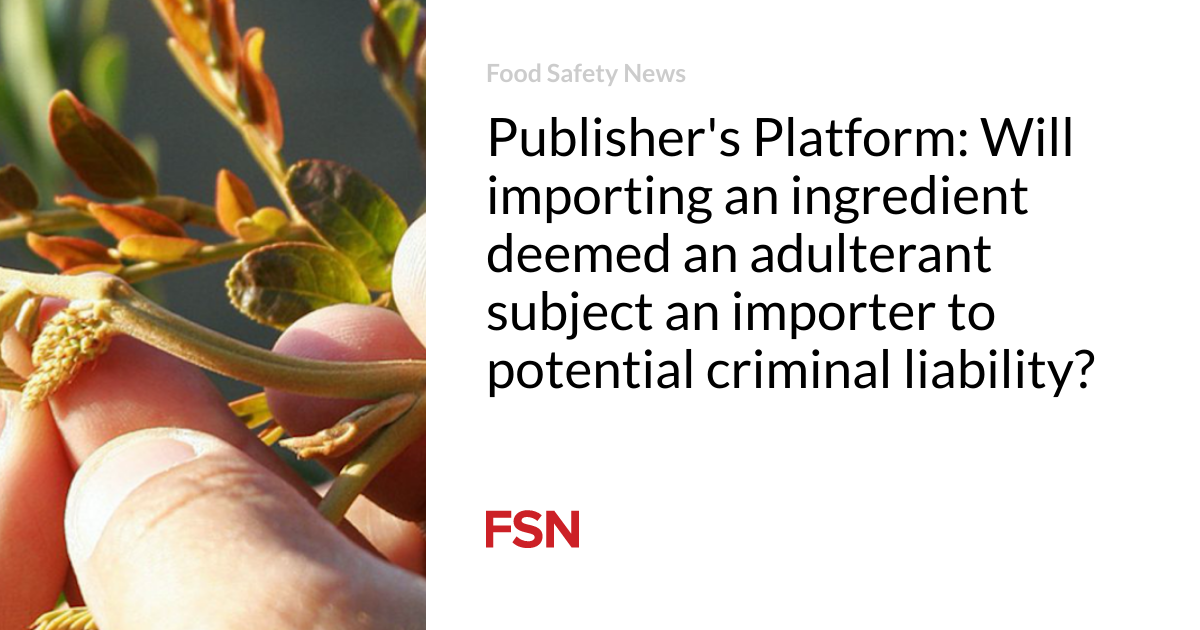First, thank you to the people that work at the FDA. Yes, I have often been a critic of the organization (or lack thereof), but the people at the FDA have always been heroes.
In December of 2023 I wrote to the FDA urging them to take a hard look at tara flour as a likely illegally imported adulterated food ingredient. Today, the U.S. Food and Drug Administration (FDA) posted on its website its determination that tara flour in human food does not meet the Generally Recognized As Safe (or GRAS) standard and is an unapproved food additive. The FDA also posted the underlying analysis. According to the FDA:
The serious adverse events and liver injury with food products containing tara flour raise serious safety questions. Overall, at this time, the available data are insufficient to support the safety of tara flour for use as a food ingredient that will be consumed by the general public.
Due to the lack of adequate data and information in the scientific literature to support the safe use of tara flour in food, DFI is unable to conclude that the addition of tara flour to food meets the statutory criteria for classification as GRAS. As such, there is an absence of consensus among qualified experts regarding the safety of tara flour use as a food ingredient. Therefore, based on the current status of data and information, tara flour does not meet the experience based on common use in food (prior to 1958) criterion, or technical evidence of safety and the general recognition of safety necessary for it to be GRAS for use in food. Further, there is no food additive regulation establishing safe conditions of use of tara flour. Based on a review of the available information, the use or intended use of tara flour in conventional food for humans is not eligible for a listed exception to regulation as a food additive [Section 201(s)(1)-(6) of the FD&C Act]. Accordingly, when tara flour is added or intended for addition to conventional food, it constitutes the use of an unapproved food additive and, therefore renders it an unsafe food additive within the meaning of Section 409(a) of the FD&C Act. Food that is, bears, or contains an unsafe food additive, such as tara flour, is adulterated under 402(a)(2)(C)(i) of the FD&C Act. Introducing or delivering for introduction an adulterated food into interstate commerce is a prohibited act under Section 301(a) of the FD&C Act.
As a result of this determination, the importer of tara flour faces potential civil and criminal liability. Under the FDCA, a person committing a prohibited act “with the intent to defraud or mislead” is guilty of a felony, punishable by imprisonment, substantial fines, or both. The key factor is the intentional nature of the act.
A misdemeanor conviction under the FDCA does not require proof of fraudulent intent or knowing or willful conduct. Instead, a person may be convicted if they held a position of responsibility or authority in a firm that could have prevented the violation. Misdemeanor convictions are punishable by up to one year in jail, a fine of up to $250,000, or both.
However, fines for violations are typically much higher than those prescribed by the statute. Here are a few examples of criminal misdemeanor penalties imposed:
Blue Bell: $19,500,000 fine
Con Agra: $11,200,000 fine
Chipotle: $25,000,000 fine
Wright County Egg (DeCoster): $7,000,000 fine and three months in jail
Odwalla: $1,500,000 fine





